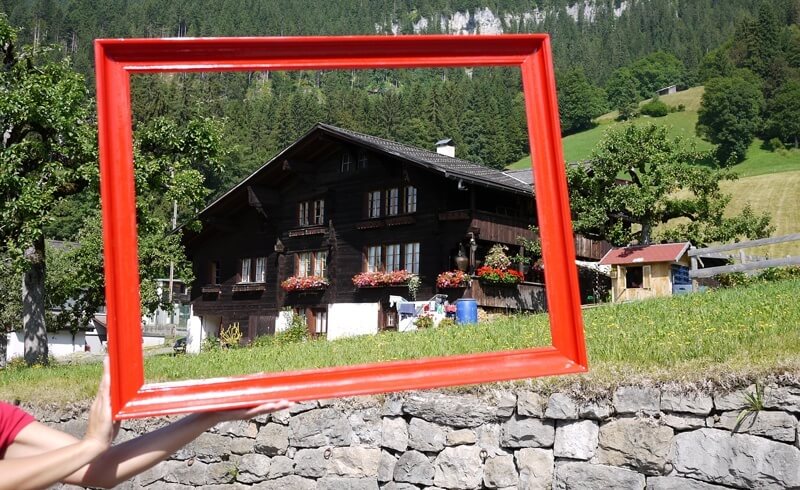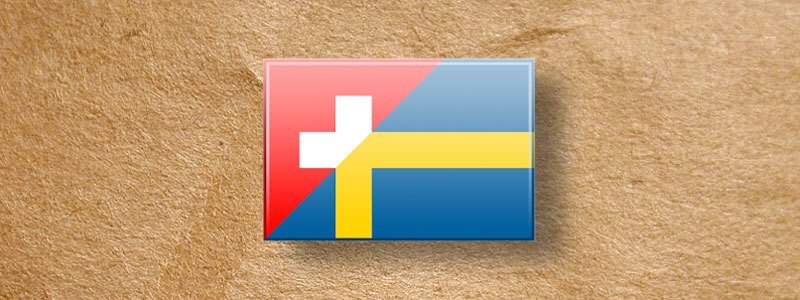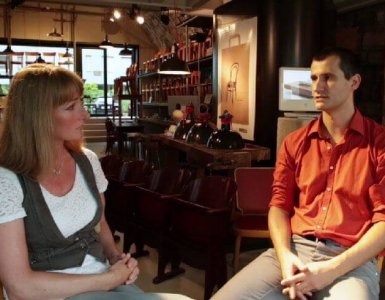Before moving to Switzerland, you have been busy brushing up your German – and so you arrive, feeling well prepared for your stay in Geneva or Zurich! You might still get the shock of your life, however...
Swiss Standard German is one of the country's four official languages, in addition to French, Italian, and Romansh. It differs only somewhat from the Standard German which is used in Germany and is taught in numerous classes around the globe.
About the Swiss German Language
If you have studied up on German before your arrival, you should be able to understand a newspaper headline or decipher a menu at a Swiss restaurant. But listening to people chatting on the bus or tuning in to a local radio station will probably leave you very much confused.
What on Earth is a Bütschgi (= apple core)? And what is a Chuchichästli (= kitchen cupboard)?
Swiss German is a special dialect which is only spoken in the German areas of Switzerland. It includes various dialects that do not have much in common with the written language. According to the Swiss federal census in 2000, over 60 percent of all German speaking Swiss nationals tend to use their regional dialect in daily life - rather than the standardized German language.
How to use a Smartphone to Communicate in Switzerland
For the poor foreigner who wants to go on a holiday or start a new life in Switzerland, the language situation can be an unexpected obstacle. But don't despair! Your mobile phone could actually be a communication lifesaver in the streets of Basel or St. Gallen, if you know how to use it...
We have researched several smartphone apps that promise to aid you in learning the respective language of your new home.
Here are the top six language apps to help you communicate in Swiss German:
Grüezi Switzerland
The free Grüezi Switzerland app is more than a language app for Swiss German. Apart from covering various dialects from Ticino, Fribourg or Grisons, it is also a travel guide for Switzerland including events and insider tips. The spoken audio recordings for common phrases allow you to communicate with the locals pretty much wherever you go in Switzerland.
utalk Swiss German
utalk Swiss German is the most expensive app on this list. As a commercial product at the price of nearly USD 10, it does have the nicest visual layout of all the apps we have tested. As an added benefit, the featured audio files are clear and easy to understand.
Swissdish
However, since the apps mostly include basic vocabulary and helpful sample phrases, it’s mainly useful for tourists and absolute beginners. Keeping that in mind, the price is a little steep.
Swissdish for Android phones is a fairly random smartphone application. As the weird name implies, it is basically a free vocabulary trainer for Swiss German to English, as well as for English to Swedish.
If you study Swiss German with another method and want a quick way to repeat new words while waiting for the bus, this is the app for you. And hey, you might pick up some Swedish, too!
Android
Schweizerdeutsch Lernen
Schweizerdeutsch Lernen is probably the best dialect app for German speakers. It is a dictionary for your smartphone that translates Standard German words into the Zurich dialect of Swiss German, offering a mobile pronunciation guide as well!
Those who already know some (non-Swiss) German will get a good bang for the buck.
iOS / Android (CHF 1.00)
Dialäkt Äpp
The Dialäkt Äpp is rather targeted at native speakers of Swiss German. With a brief quiz on language usage, it quickly helps you pinpoint which regional variety a dialect speaker uses and which part of Switzerland they come from. It’s the Professor Higgins of Swiss iPhone apps!
You speak some Swiss German, but you really want to impress your Swiss friends by ordering a Stange tap beer? This could be your app...
Mundart
The free Mundart app (which means as much as "mouth art") is still one of the best Swiss German dictionaries you can install on your Android phone. It contains more than 1000 translations, and growing... The cool thing about the Mundart app is that you can add your own words and translations to the app, turning this into one huge crowdsourcing project!
Android
Bonus: Google Translate
If all else fails, you can use the nifty Google Translate app to communicate in Standard German! This free language app will recognize the words and phrases spoken and translate them into more than 60 languages, including German and English. And since most Swiss understand both of these languages, you will get by just fine.
A killer feature for many languages (including German, French, and Italian) is that you can speak phrases into your smartphone, and it will show you the corresponding translation! So when you are stuck in language limbo or are lost in translation anywhere in the world, Google Translate could be your local buddy to help you out...













[…] See on http://www.newlyswissed.com […]
Grüezi! That’s really cool, thanks for sharing these great links with us!
and an app for windows?
or any website?
I am from switzerland and i say: Nearly anybody in switzerland will talk with you in “plain german” if he or she has to. Depending on the city you visit english is also an option but do not count on it. You really do not have to learn swiss german to communicate with the locals. German is “good enough”.
Good point! Thanks for the insights. ^Dimitri
What’s with Swiss people and them not wanting others to learn their dialect? lol. My father was Swiss and he didn’t want me to learn the dialect (although I did learn to understand it, by my own). Every Swiss person I meet will try to “talk me out” of learning the dialect. I mean, here in Peru we love when foreigners try to learn Quechua (our ancient language). Is there a reason behind it? Cuz’ that’s the exact recipe for a dialect’s death.
Well said. You’re right about it, but the main reason why Swiss-German speakers keep talking others out of learning their dialect is mostly because a) it’s complicated, and b) it’s not necessarily worth it given the limited use. Do you have a theory? ^Dimitri
Not so much of a theory but the certainty that Swiss-German is going to die soon if Swiss people don’t do anything about it. Swiss is facing lots of immigrants on a daily basis, they don’t like to speak SD because it’s too complicated so they stick with plain German or mostly French. I mean, I’m concerned being half-Swiss and yet I perceive no real concern from native Swiss people… which kinda worries me since I love the dialect.
But then again, I’m probably being just too darned romantic about the whole issue when it’s not even a real problem for Swiss dialect speakers.
Hopp Schwiiz!
…and keep up the good work with the blog!
Dankä villmal, Manuel! *blushing*
I would encourage anyone who moved to Switzerland to stay to learn the local dialect. Depending what mother tongue people have some will have less and others will have more problems to learn it. But the more you hear and speak it it will stick.
Living for 13 years in the UK I do start to realise that knowing English, Swiss German, German and what got stuck of school French I can understand the basics of Dutch, Danish and Swedish.
I was watching “The Killing” and “The Bridge” and I listened more than reading the subtitles. I heard a few things I was like ‘Oh, that’s the same in Swiss German!’ :D
After living in the English speaking world for over 40 years, I discovered about 20 years in that Swiss German and English share the same sentence structure. High German is totally different.
I also remember in Grade 8 in English class when the teacher asked me what a “Gurke’ was in English. That’s when my dad’s Berndütsch word came to my mind ‘gugumera’ there it was cucumber.
Now I understand why it is easier to learn English for a Swiss German speaking person than a High German speaking one.
On my recent trip to visit my mom in Minusio I overheard foreigners talking on the train about their German class in English. Hasn’t anybody figured out that it would be much easier to teach English speakers Swiss German with the same sentence structure than having to learn High German?
Din Kommentar isch korrekt! Your comment is correct! :-)